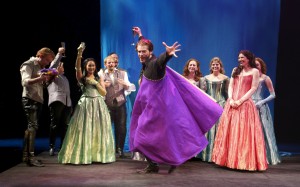THE PLAY’S NOT REALLY THE THING, THE PRODUCTION IS
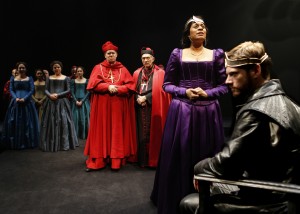 Further earning a proud name, Chicago Shakespeare Theater has produced Henry VIII for the first time in professional Chicago theater history. The history cycle is finally finished. Fortuitously, all this happens exactly 400 years after it premiered at the Globe Theatre when, alas, an accident with a cannon caused a fire that destroyed the Southwark shrine (which has been its recently recreated). Happily, Barbara Gaines’ spirited staging ignites the play in a less lethal manner. But no way is this a sexy saga a la Showtime’s The Tudors or an expose like Hilary Mantel’s prize-winning Bring Up the Bodies. But it’s a testament to Tudor tenacity, even if Henry seems more of a manipulator than a prime agent in his own reign.
Further earning a proud name, Chicago Shakespeare Theater has produced Henry VIII for the first time in professional Chicago theater history. The history cycle is finally finished. Fortuitously, all this happens exactly 400 years after it premiered at the Globe Theatre when, alas, an accident with a cannon caused a fire that destroyed the Southwark shrine (which has been its recently recreated). Happily, Barbara Gaines’ spirited staging ignites the play in a less lethal manner. But no way is this a sexy saga a la Showtime’s The Tudors or an expose like Hilary Mantel’s prize-winning Bring Up the Bodies. But it’s a testament to Tudor tenacity, even if Henry seems more of a manipulator than a prime agent in his own reign.
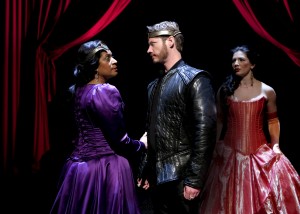 Written by Shakespeare at the end of his days in collaboration with John Fletcher (of Beaumont & Fletcher), this episodic chronicle delivers a patriotic pageant, even as it details the deserved but wrenching downfall of Cardinal Wolsey and the torturous replacement of first queen Katherine of Aragon with Anne Boleyn, here portrayed as a miracle of maidenhood, not the goodtime girl who lost her head — conveniently clearing the way for Jane Seymour who would finally give spouse-abusing Henry the son he always wanted. (Departing from the script, the final scene depicts a coquettish Jane in a dumb show, supplanting an astonished and unamused Boleyn.)
Written by Shakespeare at the end of his days in collaboration with John Fletcher (of Beaumont & Fletcher), this episodic chronicle delivers a patriotic pageant, even as it details the deserved but wrenching downfall of Cardinal Wolsey and the torturous replacement of first queen Katherine of Aragon with Anne Boleyn, here portrayed as a miracle of maidenhood, not the goodtime girl who lost her head — conveniently clearing the way for Jane Seymour who would finally give spouse-abusing Henry the son he always wanted. (Departing from the script, the final scene depicts a coquettish Jane in a dumb show, supplanting an astonished and unamused Boleyn.)
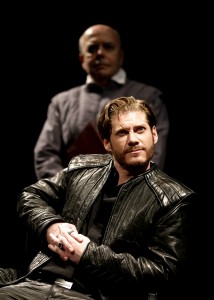 The reason why ambitious Anne is treated so reverently is, of course, that, for all her fornications and eventual beheading, she was the mother of Elizabeth the Great: The princess’ christening provides the play’s conclusion, replete with pompous prophecies of a golden age half a century to come.
The reason why ambitious Anne is treated so reverently is, of course, that, for all her fornications and eventual beheading, she was the mother of Elizabeth the Great: The princess’ christening provides the play’s conclusion, replete with pompous prophecies of a golden age half a century to come.
The sometimes static story is faithfully rendered, but this is not a period production: Gaines’ theatrical restoration employs Mariann S. Verheyen’s gorgeous pseudo-medieval costumes and lots of falling fabrics on James Noone’s almost nonexistent set, which includes a sprawling and flaming dumpster where people go when they die á la Mrs. Lovett in Sweeney Todd. (Whatever). It’s all meant to illustrate a very uneven script which lacks a backbone; it is more a series of scenes in which the title monarch (dashing Gregory Wooddell, no fat and greasy later Henry) seldom gets to do more than react to events. He either condemns Wolsey — for failing to get Rome’s approval of his divorce of Katherine (and for amassing too much wealth in his stately Hampton Palace) — or defends Cranmer, the real founder of the Church of England who narrowly escapes the same fall as his Catholic nemesis Wolsey.
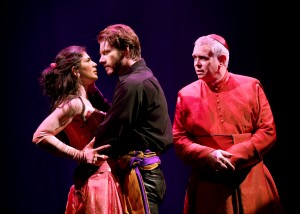 Standing out from the rest, the great moments come with Scott Jaeck’s thuggish but ultimately pathetic Wolsey, who makes much of the great speech Shakespeare gives him detailing the pride that came before his fall, and a similar pathos from Ora Jones’ magnificent Katherine, as dignified in her humiliation as she was undeserving a divorce. (Since she was the niece of the Spanish king, Henry dared not harm her beyond the disgrace of demotion.) Less distinguished in dialogue or psychology, Christina Pumariega’s sensuous Anne mellows in a pretend-innocence nicely punctured by Kate Buddeke as her wheedling maidservant (on the cast list as “Old Lady”).
Standing out from the rest, the great moments come with Scott Jaeck’s thuggish but ultimately pathetic Wolsey, who makes much of the great speech Shakespeare gives him detailing the pride that came before his fall, and a similar pathos from Ora Jones’ magnificent Katherine, as dignified in her humiliation as she was undeserving a divorce. (Since she was the niece of the Spanish king, Henry dared not harm her beyond the disgrace of demotion.) Less distinguished in dialogue or psychology, Christina Pumariega’s sensuous Anne mellows in a pretend-innocence nicely punctured by Kate Buddeke as her wheedling maidservant (on the cast list as “Old Lady”).
With a wizard Chicago cast, the history play gains immensely from Mike Nussbaum’s curmudgeonly narrator, Andrew Long’s doomed bravery as the unfortunate Duke of Buckingham, Lance Baker’s predatory Bishop of Winchester, David Darlow’s sardonic Cardinal Campeius, and stalwart Andrew Long as the righteous Archbishop of Canterbury. As much as a 16th century spectacle, it’s a virtual inventory of the finest Chicago actors circa the spring of 2013.
photos by Liz Lauren
Henry VIII
Chicago Shakespeare’s Courtyard Theater at Navy Pier
scheduled to end on June 16, 2013
for tickets, call 312.595.5600 or visit http://www.chicagoshakes.com
for info on this and other Chicago Theater, visit http://www.TheatreinChicago.com

